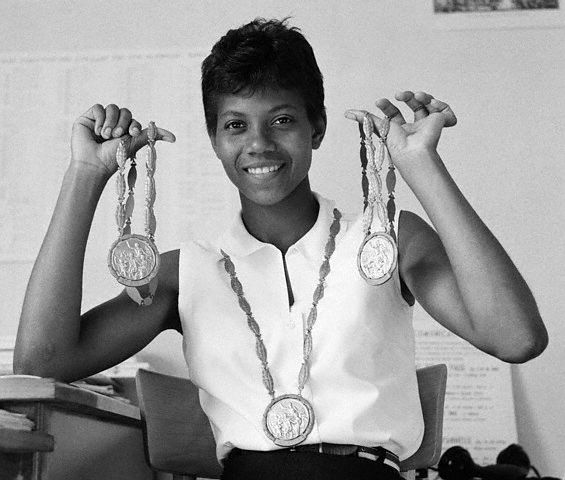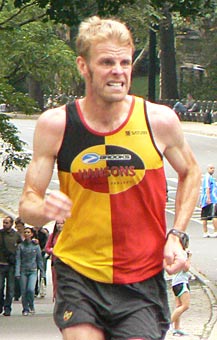The second part of this blog topic is simple. I already suggested that a Marathon Olympic Trials B standard for men inspires hundreds of athletes, who in turn inspire a new generation of runners. This post is dedicated specifically to just a few examples of those American "B" type athletes, who at one point in their career or another were not expected to perform, but were somehow given another chance.
Wilma Rudolph -
Talk about a woman who overcame obstacles: if growing up poor and black in the 1940s wasn't enough, add a premature birth (at 4.5 pounds birthweight, to be exact) and the fact that she was the 20th of 22 children born to the same family. Wilma Rudolph had to face a racist culture and literally rewrite many standards. She is credited with many integration efforts, particularly in her home state of Tennessee, where she refused to take part in a segregated welcoming parade.
What inspires me most about Wilma Rudolph is the fact that she contracted polio at the age of four and was told that she may have difficulty walking for the rest of her life. Her dedicated family not only traveled great distances to take her to the doctor, but they learned how to perform massage physical therapy and treated her left leg several times a day. Eventually, she not only outgrew the leg braces that she wore, but she challenged every boy in her town to race.
The fact that she got the opportunity to race in the sport of track and field at all is a miracle, as her high school didn't have a track team. Luckily, Ed Temple of Tennessee State University saw talent in a young basketball player and recruited her to run in college.
Polio wasn't the only affliction that Wilma Rudolph overcame. By the time she was twelve, she had also contracted scarlet fever, whooping cough, chicken pox, and the measles. Without opportunity to show her talent, the world would never have known who Wilma Rudolph was. She is reason number 1 to give more athletes the opportunity to compete.
Katherine Switzer -
Say what you will about Katherine Switzer and her running career. Without her literal efforts to create opportunities for women to run, the women's marathon might not have become an Olympic event in time to know how great Joan Benoit (Samuelson's) victory could be.
Because she was willing to defy the standards of who could and couldn't run the Boston Marathon in 1967, she allowed others to follow in her footsteps. It's hard to imagine the Boston Marathon today without the drama of women's racing. Not to take anything away from the men, but I will not soon forget the nail-biting race in 2009 where the first three women's finishers were separated by eight seconds. Katherine Switzer is living proof that a wider door of opportunity is good for the sport and its competitors.
Brian Sell -
Maybe you're thinking that Sell doesn't fit in this category. There is nothing "B" rate about him. He is a stand-up guy with a family, a job, and the resources of the Hansons-Brooks Distance Project behind him (or at least, this was the case until he retired from the sport). But somehow his image became synonymous with "blue collar" running after his gutsy yet unsuccessful performance in the 2004 Olympic Trials. He led the race until mile 21 that day, and finished a disappointing 13th. By qualifying for the Olympics four years later, Sell proved that hard work pays off. He may not have been ready to run fast enough to drop the field in 2004, but in 2008 he broke away and held on to earn his spot.
In many respects, Sell is the prime argument for a "B" Standard because he believed in himself enough to put in the necessary miles for nearly a decade after college in order to transform into a great marathoner. He begs the question: how many other great US Marathoners are waiting to blossom with years of consistent training? I challenge the USATF to consider the drop in numbers of men who are training for 2012 versus previous Olympiads. If we deplete the talent pool by discouraging some of our younger runners, the chances of competing successfully on an international level go down.
Dan Hocking -
Okay so maybe I'm a bit biased on this one. I just finished Elizabeth Gilbert's Committed and read that we tend to put tremendous pressure on our spouses here in America. We don't just want life partners, we want spouses who inspire us. Dan may be my husband and an inspiration to me, but I think he fits the description of any generic fill-in-the-blank US runner who dreams of competing on a national level and just needs reason to hope as motivation to train.
The reason why I single Dan out is that he deserves the opportunity to compete. After an injury to a tendon in his hamstring that ended his college career early and prevented him from joining a professional running club, he was forced to take six years off from running. Any occasional jog would be incredible painful physically, but it was more of a psychological blow than anything. I can't imagine dreaming of all the national competitions he might qualify for one day, to then hoping merely for a chance to play tag with his nephew without pain the next day.
I should admit that the lack of an Olympic Trials "B" Standard doesn't hurt Dan all that much; he's talented enough that he has every right to dream of making the "A" Standard.
I could go on. There are hundreds of examples of athletes who have overcome obstacles because they were given opportunities, and because they believed in themselves enough to create an opportunity. For today, my point stands that adding a "B" Standard for the men would be a benefit for today's athletes as well as the future of the sport.




No comments:
Post a Comment